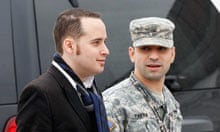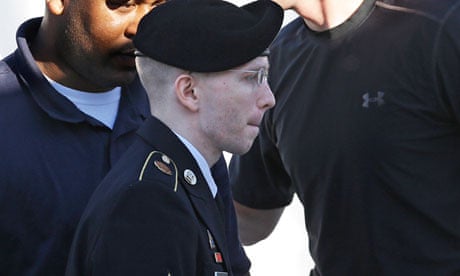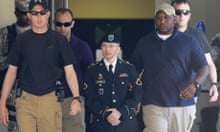Bradley Manning, the soldier accused of the biggest intelligence leak in US history, came face-to-face on Tuesday with the man who turned him in to military authorities.
Adrian Lamo, a former computer hacker, was giving evidence at the court martial of Manning, whom he had never met but whose life he changed dramatically by informing on him to counter-intelligence officers.
Manning's defence lawyer used the cross-examination of Lamo to explore the soldier's motivations and state of mind at the time he transmitted a huge amount of secret information to the open information website, Wikileaks.
The court heard that Manning had indicated to Lamo that he had decided to leak the information as a way of instigating a worldwide debate and disseminating the truth.
Lamo said that he had engaged over the space of six days from about 20 May 2010 in a web chat with Manning. The soldier had originally contacted him via a Gmail and military email address, but at Lamo's suggestion they switched to an encrypted AOL instant messaging channel to keep their conversation private.
Lamo, dressed in black and with a silver cross around his neck, told the court that he had cross-referenced Manning's email, AOL chat and Facebook page to ascertain his identity and association with the military.
David Coombs, Manning's principal civilian lawyer, used the cross-examination to elucidate the soldier's state of mind at the time of the leak. The questioning was subject to tetchy exchanges with prosecution lawyers who objected at several points that it was drifting into hearsay.
Lamo told Coombs that Manning had indicated in the course of the conversations that he knew the witness was a "grey-hat hacker" – ie he broke into computer systems to test their security weaknesses; that he was involved in the LBGT community; and that he had donated to WikiLeaks. "He told you he reached out to you as someone who might understand him?" Coombs asked.
"That is correct," Lamo replied.
Lamo concurred with the defence lawyer that at the time of their chats Manning presented himself as an emotional wreck who was conflicted over his gender, felt as though his life was falling apart and had suicidal thoughts. "He told you he had no one he could trust and that he needed a lot of help; he even apologised to you for pouring out his heart as you were total strangers?"
"Correct," Lamo replied.
In his evidence, Lamo admitted to a past life as a hacker. In 2004 he pleaded guilty and was sentenced to six months' house arrest having broken into the computer systems of the New York Times, Microsoft and Lexus Nexus.
Lamo also told the court that he had been diagnosed with several mental health conditions, including Asperger's, major depression and general anxiety. He takes medications to assist living with these conditions, and admitted to periods in which his use of the drugs had effected his memory; he has previously told the media that he has struggled periodically with painkiller addiction. But he said that his memory was not impaired in such a way either at the time he engaged in the web chats with Manning or currently giving evidence.
Lamo has become a hated figure for supporters of Manning and WikiLeaks. When news of Lamo's testimony was broadcast, Twitter resounded with depictions of him as "scum", "snitch" and worse.

In earlier pre-trial hearings the judge presiding in the case, Colonel Denise Lind, ruled that the defence must not discuss the soldier's motive for leaking in the course of the trial up to verdict. Such discussion would have to await the sentencing stage, should Manning be found guilty.
But Coombs siezed the cross-examination as an opportunity to presenting the court with Manning's own contemporaneous explanations to Lamo for why he had embarked on such a massive official leak. "He told you he was the kind of person who would always investigate the truth?"
"That was something I could appreciate," Lamo said.
Lamo concurred under this line of questioning that Manning had told him in the chats that he believed the state department cables revealed "how first-world countries exploited third-world countries".
Everywhere there was a US ambassadorial post, a diplomatic scandal would be uncovered by the cables, Manning said. The information would also disclose casualty figures in Iraq.
"He told you it was important the information got out. That if it got out it might actually change something," Coombs said.
The defence lawyer went on, quoting from elements of the Manning-Lamo web chats: "He did not believe in good guys and bad guys anymore, only a plethora of states acting in self interest. He thought he was maybe too idealistic. He told you based on what he had seen he couldn't let the information stay inside. He said he felt connected to everybody, we were all distant family. And he said he cared.
"He called himself a humanist and said he had custom dog tags where he had written humanist on the back. PFC Manning told you that we are all human and we are killing ourselves and no one seems to care. He told you he was bothered that nobody seemed to care, that apathy was far worse than active participation. He told you that he preferred the painful truth over blissful fantasy."
To each refrain, Lamo replied: "He did."
"At one point you asked what his end game was," Coombs said.
"Yes I did," Lamo replied.
"And he told you: hopefully worldwide discussions. He told you reaction to the Apache video gave him immense hope. He wanted people to see the truth. He told you people would actually change if they saw the information. He also told you that he recognised he might just be young, naive and stupid."
"He did," Lamo replied.
At the end of the cross-examination, Coombs asked Lamo whether the soldier had said anything in the course of the six days of web chats that indicated he wanted to do harm to the US, denigrate the US flag or help the enemy.
"Not in those words, no," Lamo said.
Major Ashden Fein, the lead prosecution lawyer, followed up by asking Lamo whether Manning had admitted in the web chats to knowing Julian Assange, the founder of WikiLeaks. Lamo said that the soldier had admitted to that, as well as to having violated military rules in leaking hundreds of thousands of classified documents.










Comments (…)
Sign in or create your Guardian account to join the discussion